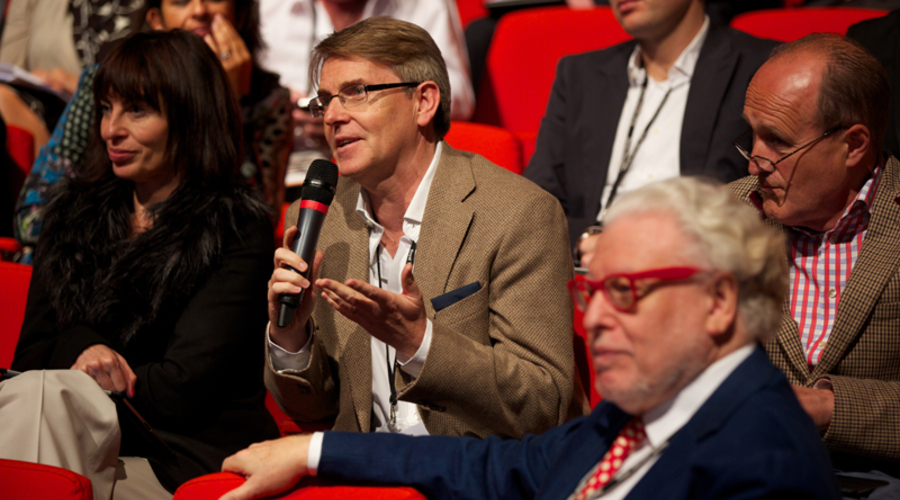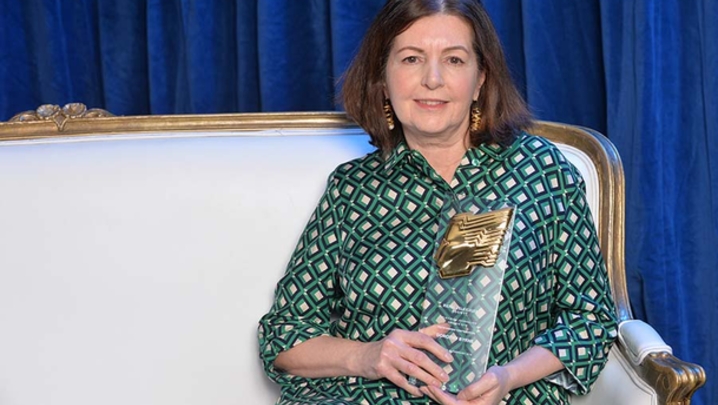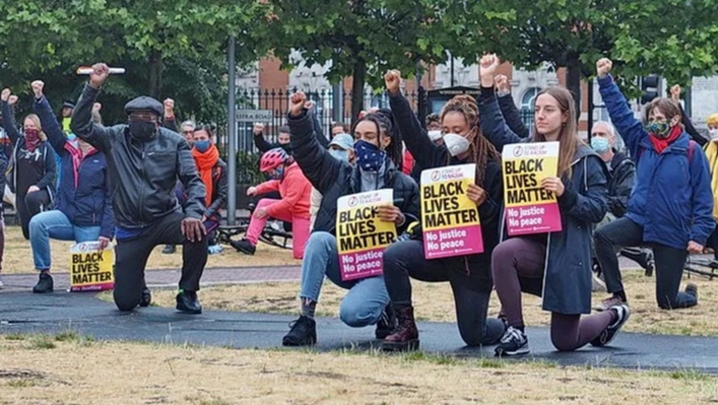John Hardie tells Steve Clarke how ‘authentic, high-impact storytelling’ is at the heart of ITN’s revival
There was a time when ITN was simply a news provider struggling to make money. Not any more. Today, the company is highly profitable and is as likely to film a Football League match or produce a feted Lego ad for BT as it is to send Tom Bradby to Brussels to anchor News at Ten. ITN is even developing drama.
“I don’t think we’ll be doing Wolf Hall or Game of Thrones any time soon,” says CEO John Hardie wryly. “But looking at some of the bigger stories of the past few years and finding ways to bring those to the screen dramatically is something that I believe ITN can do.”
He mentions Carnival’s award-winning two-parter for ITV, The Lost Honour of Christopher Jefferies, as the sort of factually based material that ITN might invest in.
Considering what Hardie has already achieved at the firm, the idea of co-producing a signature drama, even one as finely wrought as the film he mentions, seems utterly plausible. He was appointed to run ITN during the dark days of 2009. Then, the company’s finances, hit by a £22.8m pension deficit, were so dire that some commentators wondered whether ITN and all the pioneering things it stood for in television journalism were facing extinction.
But Hardie, who had previously held important jobs at ITV and Disney, set about diversifying, and turned the company around.
In 2015, ITN Productions’ revenues rose by 44%, year-on-year, thanks to making shows such as BBC Two’s Young Vets, Channel 4’s Dispatches and The Agenda for ITV. The division’s success helped to raise the operating profits of the ITN group to £5.76m on revenues of £112m.
Last month, the CEO announced another set of expansion plans, as he revealed bold targets to grow ITN’s revenues to more than £180m by the end of 2020. The group aims to expand on both sides of the Atlantic. Its operations are being reorganised into two divisions: Broadcast News and ITN Productions.
While TV news will remain at the heart of the firm’s activities, ITN hopes its non-news businesses will generate more than 50% of total revenues by 2020. “Our ambition is that ITN will become a world-class production company,” stresses Hardie, adding: “ITN is about world-class television news and business that arises naturally from that.”
Its business philosophy is summed up in what the CEO describes as “authentic, high-impact storytelling”. And it is this mantra that informs the company’s approach to its separate, but related, activities: broadcast news, sports production, digital content services, advertising production and television production.
The plan is for ITN Productions to grow to the same size as the broadcast news division by 2020. Anyone involved in producing content needs no reminding that it is an inherently high-risk business. ITN Productions, however, is already one of the UK’s biggest indies. Its clients include all the big British broadcasters, alongside US channels such as Discovery and A+E. “We’ve made great strides in the US in the last couple of years,” notes Hardie.
What began as making fast turnaround documentaries for organisations such as National Geographic, the Smithsonian and Discovery, is morphing into a more significant operation.
In 2015, ITN produced its first US series, the 10-part crime show Killer Instinct, which was subsequently recommissioned. The objective is for the US “to become 10% of the much larger ITN by 2020”, says Hardie.
But in such hyper-competitive and uncertain times, isn’t Hardie worried about whether he can deliver such an ambitious strategy?
“I think these are extremely good times to be in the content production business,” says the CEO emphatically. “In the US, the spectrum of clients ranges from the classic networks to the cable channels to the Netflixs and Amazons.
“Yes, there is plenty of competition, but we need to be very clear about what our competitive advantages are. We will win business through the speed and quality of what we do.
“We can make high-quality programmes very quickly. That’s what our clients like about us.”
The approach is to “get good in one area and expand from that”. The commitment is to grow organically, rather than, say, buying a producer specialising in factual entertainment and folding it into ITN.
“There’s a lot to be said for, when you grow, keeping it all together in one location, rather than having a patchwork quilt of little production companies all over Soho and elsewhere.
“I want to keep us together as one ITN. I’m not even considering an acquisition just now because, if I did one, I’d want it to be completely absorbed and contribute not just to its own business but to all of ITN.”
The synergies that can arise from such a holistic approach to the business are obvious in current affairs series such as ITV’s The Agenda and Channel 4’s Dispatches: ITN produces The Agenda and is a regulator contributor to Dispatches. They are also evident in ITN’s expanding sports division. “People are surprised at how big we are in sport these days,” suggests Hardie. ITN produces match clips and highlights for The Sun and The Times’ smartphone services. It also holds the contract with the Football League to film 1,800 matches a year and assemble highlights packages for, among others, Channel 5.
“We’re gearing up substantially,” says Hardie. “Consider what sports says: it’s largely live production and fast-turnaround journalism. And that’s what ITN does.”
Yet ITN knows that, at least in the short term, people’s perceptions of ITN are wedded to the health – or otherwise – of its flagship news bulletins for ITV, Channel 4 and Channel 5.
It is still too early to give a definitive verdict on the relaunched ITV News at Ten, but there is no doubt that poaching the BBC’s Robert Peston and Allegra Stratton, respectively Political Editor and National Editor, has given the bulletin extra analytical heft.
The BBC’s Ten O’Clock News still has more viewers (a consolidated average of 4.2 million against ITN’s 1.8 million in the year to date).
Hardie, however, seems content that the programme is heading in the right direction: “Television news is not a business where you make a few changes and suddenly the ratings respond.… I am very satisfied with the ratings, as is ITV.”
The CEO adds: “I think it’s been noticed by a lot of people that this is now a very good and very intelligent show that has maintained ITN’s edge on great dramatic storytelling, but has moved on into penetrating, deep analysis.”
Are other BBC journalists in his sights? “We find that a lot of people are knocking at our door these days. We’re open to consider people, but then we’ve got some of the best in the business in our existing stable.”
On the vexed question of persuading younger viewers to adopt the ITN habit, Hardie is clear and not at all defensive. For them, ITN’s news needs to arrive seamlessly, wherever they are and on whatever devices they are using.
“It’s about a generation on mobile, a generation on social media. Rather than us say, ‘If we build it, they’ll come’, and us investing in websites and dragging people to them, our approach is: wherever you are, we will use social media, breaking and rolling news and tailor it to make it interesting so that it appears naturally,” he says.
Meanwhile, the difficulty of dealing with ITN’s pension deficit remains. A year ago, it emerged that the deficit had grown to £98.5m, up from £80.4m. How concerned is Hardie by this situation?
“We’ve made massive headway in profitability but the frustrating thing is that those profits have largely had to be invested in the pension deficit,” he says. “One reason why we want to boost our financial performance is that, not only then do we make payments to the pension deficit, but we’ve also got more money to invest in future growth.”
Hardie on… the BBC
‘The BBC may be a rival to us in journalism but it is not our enemy. The BBC is extremely important to television broadcasting. We see the BBC as a client that we want to work with.
‘We’ve worked very hard in the past few years to try and come up with programme ideas that we think work for the BBC. Our ambition is to do a lot more business with the BBC in the future.…
‘I’m a lot less concerned about BBC Studios competing with us. I’m more concerned that the BBC opens its doors so there are many more opportunities for independent producers like us. If it’s a two-way street, we have no problem.…
‘Everyone talks about what the problem with the BBC is, but there’s not one problem or one concern. So long as the BBC is contributing towards a healthy ecology in broadcasting production we have no other issues with it.
‘Yes, it is massively better funded than ITN in news, and across all of its business, but we’ve never advocated a reduction in the funding of BBC News or any part of the BBC.
‘Nor have we advocated a reduction in the licence fee. To be honest, I am busy enough running ITN without telling the BBC how big or how well it should be run.…
‘We used to think that not having 24/7 news was a disadvantage. Now, in the world of Facebook and Twitter, we can break news digitally.…
‘Does BBC News still need a new channel in an online age? You can argue it both ways. I am genuinely agnostic. In terms of competition, it is more a matter for Sky and CNN.’
Hardie on… diversity
‘In the past few years BAME (black and minority ethnic) representation among ITN employees has increased from slightly below the national average to slightly above it.
‘That’s no cause for celebration: it’s only national, as opposed to London. I think we’re up from 11% to 14%, or something above that.…
‘On screen, or for any other part of what we do, our goal is for every part of ITN to be at or above the national average.… In London, where the BAME population is about 40%, we’ve obviously got a long way to go.…
‘Lenny Henry’s stimulus is making us take this more seriously. We’ve done a much better job in recruitment in the past few years, making sure that we reach places so that people from those communities realise this is a place you can come and work for.…
‘Recently, every single manager completed unconscious bias training.…The job is not done when you hire people, it only begins when you hire people from different backgrounds to your own.
‘You have to create an environment where people feel they can thrive.’







